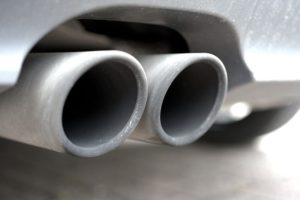Diesel fumes
Diesel engine exhaust fumes can cause cancer

Diesel engine exhaust fumes have been classified as carcinogenic, experts from the World Health Organization (WHO) have concluded.
 The International Agency for Research on Cancer (IARC) found sufficient evidence that exposure to diesel exhausts is associated with an increased risk of lung cancer. They also noted limited evidence that exposure could lead to an increased risk of bladder cancer.
The International Agency for Research on Cancer (IARC) found sufficient evidence that exposure to diesel exhausts is associated with an increased risk of lung cancer. They also noted limited evidence that exposure could lead to an increased risk of bladder cancer.
The IARC had previously categorised diesel exhausts as ‘probably carcinogenic to humans’. The updated classification follows the findings earlier this year of a US study of occupational exposure to such emissions in underground miners, which showed an increased risk of death from lung cancer in exposed workers.
The IARC also warns that people are not only exposed to motor-vehicle exhausts but also to exhausts from other diesel engines, including other modes of transport, such as diesel trains and ships, and from power generators.
Dr Christopher Portier, who led the assessment, said: “The scientific evidence was compelling and the Working Group’s conclusion was unanimous: diesel engine exhaust causes lung cancer in humans.
“Given the additional health impacts from diesel particulates, exposure to this mixture of chemicals should be reduced worldwide.”
Dr Christopher Wild, an IARC director, called for more action to protect populations from the risks of diesel fumes. He said: “This emphasis is needed globally, including among the more vulnerable populations in developing countries where new technology and protective measures may otherwise take many years to be adopted.”
Approaches to managing the risks associated Musculoskeletal disorders
In this episode of the Safety & Health Podcast, we hear from Matt Birtles, Principal Ergonomics Consultant at HSE’s Science and Research Centre, about the different approaches to managing the risks associated with Musculoskeletal disorders.
Matt, an ergonomics and human factors expert, shares his thoughts on why MSDs are important, the various prevalent rates across the UK, what you can do within your own organisation and the Risk Management process surrounding MSD’s.
Diesel engine exhaust fumes can cause cancer
Fumes from diesel engines have been classified as carcinogenic, experts from the World Health Organisation (WHO) have concluded.
Safety & Health Practitioner
SHP - Health and Safety News, Legislation, PPE, CPD and Resources Related Topics
New flexible working legislation – what does it mean?
‘The time is now, the business of tackling people’s mental health has to be a priority’ – Peter Kelly from Mates in Mind
Amazon’s global head of safety to step down

 The International Agency for Research on Cancer (IARC) found sufficient evidence that exposure to diesel exhausts is associated with an increased risk of lung cancer. They also noted limited evidence that exposure could lead to an increased risk of bladder cancer.
The International Agency for Research on Cancer (IARC) found sufficient evidence that exposure to diesel exhausts is associated with an increased risk of lung cancer. They also noted limited evidence that exposure could lead to an increased risk of bladder cancer.
New HSE funded research shows that , nearly 4,000 construction workers a year are dying from occupation-related cancer..
sun exposure – linked to around 1,540 skin cancer cases; silica exposure – linked to 910 cancer cases; and diesel engine exhaust – linked to 800 cases.
And these figures are based on the lowest possible outcome?
I thought all fossil fuels burnt of toxins, of which many are known carcinogens?
However, the IARC review did acknowledge the
significant progress that has been made worldwide to
reduce emissions from diesel engines and recognized the
very significant differences in both the composition and
quantity of emissions from today’s new diesel engine
technology, compared to the older engines that were the
subject of the studies considered by the Panel.
Has the WHO just spent millions of dollars & time to prove what was already very well known – i.e. carbon particles from combustion processes carry on their surface hundreds of decomposition products – many of them carcinogenic? Didn’t they know that diesel engine fumes carried high concentrations of such particulates of less than 10 microns in size – known as PM10? Didn’t they know that such particles are ‘respirable’ – i.e. small enough to be breathed deep into the lung? What a waste!